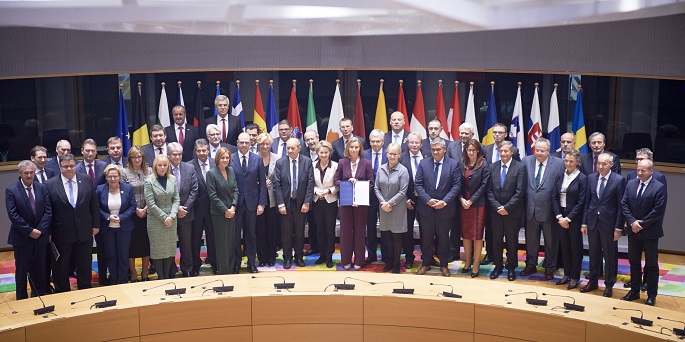23 EU members signal common defense pact
Published : 14 Nov 2017, 00:35

After decades in discussion, common European defense has taken a significant step towards becoming reality in Brussels after 23 European Union (EU) members signed their intent on Monday to join a pact to finance, research and deploy military forces in a permanent cooperative agreement.
A joint notification letter on the Permanent Structured Cooperation (PESCO) was made available for signature in the margins of Monday's EU foreign affairs meeting at the European Council, with all EU members signing on to what will be a binding agreement, with the exception of Denmark, Ireland, Malta and Portugal, and excluding the Brexit-bound Britain.
"We are definitely turning to a historic moment in European defence," said EU foreign affairs chief Federica Mogherini at the signing, while indicating the agreement was "open also for other Member States that might want to join at a later stage."
The joint notification letter sets the process in motion, with the pact to be agreed upon by a qualified majority at the European Council as early as its next meeting in December, launching PESCO.
With its basis established in European Union treaties, PESCO will be supported by the European Defense Fund, passed in June 2017, and aim for "ambitious and more binding common commitments" among the member states which have chosen to adopt the framework, including "regularly increasing defense budgets in real terms in order to reach agreed objectives."
Monday's notification letter includes the principles of the pact, with 20 percent of medium term spending to be targeted at addressing procurement for gaps in military capability, and 2 percent of spending dedicated to military research and development. Beyond expenditure, PESCO will aim to address joint capability analysis, in order to avoid both gaps and doubling.
"Today we are taking a historic step," said German Foreign Minister Sigmar Gabriel. "We are agreeing on the future cooperation on security and defense issues ... it's really a milestone in European development."
The move by EU member states to take a further step towards common European defense comes just after a NATO defense ministers' meeting agreed to revise the alliance's command structure and develop two new bases in Europe.
PESCO will be able to complement NATO with strategic and operational capabilities not covered by NATO treaties. In addition, and like NATO, the PESCO framework will develop military forces and capabilities that will remain national.
The text of the notification letter does stress that PESCO will be "inclusive" and "a strong political signal to our citizens and the outside world," though some observers that this will mean cooperation between strong militaries, like that of France, with some of the weaker forces in Europe.
"As the UK, the largest European military spender in NATO, prepares to leave the EU, and considerable differences in strategic culture remain between France, Germany, Italy, and Spain (and other EU governments), it is difficult to believe that using the PESCO mechanism will add much concrete military value to EU security efforts," said Daniel Keohane for the foreign policy think tank Carnegie Europe in February, when the PESCO terms were being developed.
A Monday afternoon meeting between European Council officials and NATO Secretary General Jens Stoltenberg also confirmed that work within the EU framework on PESCO and military mobility would serve the interests of both organizations.

